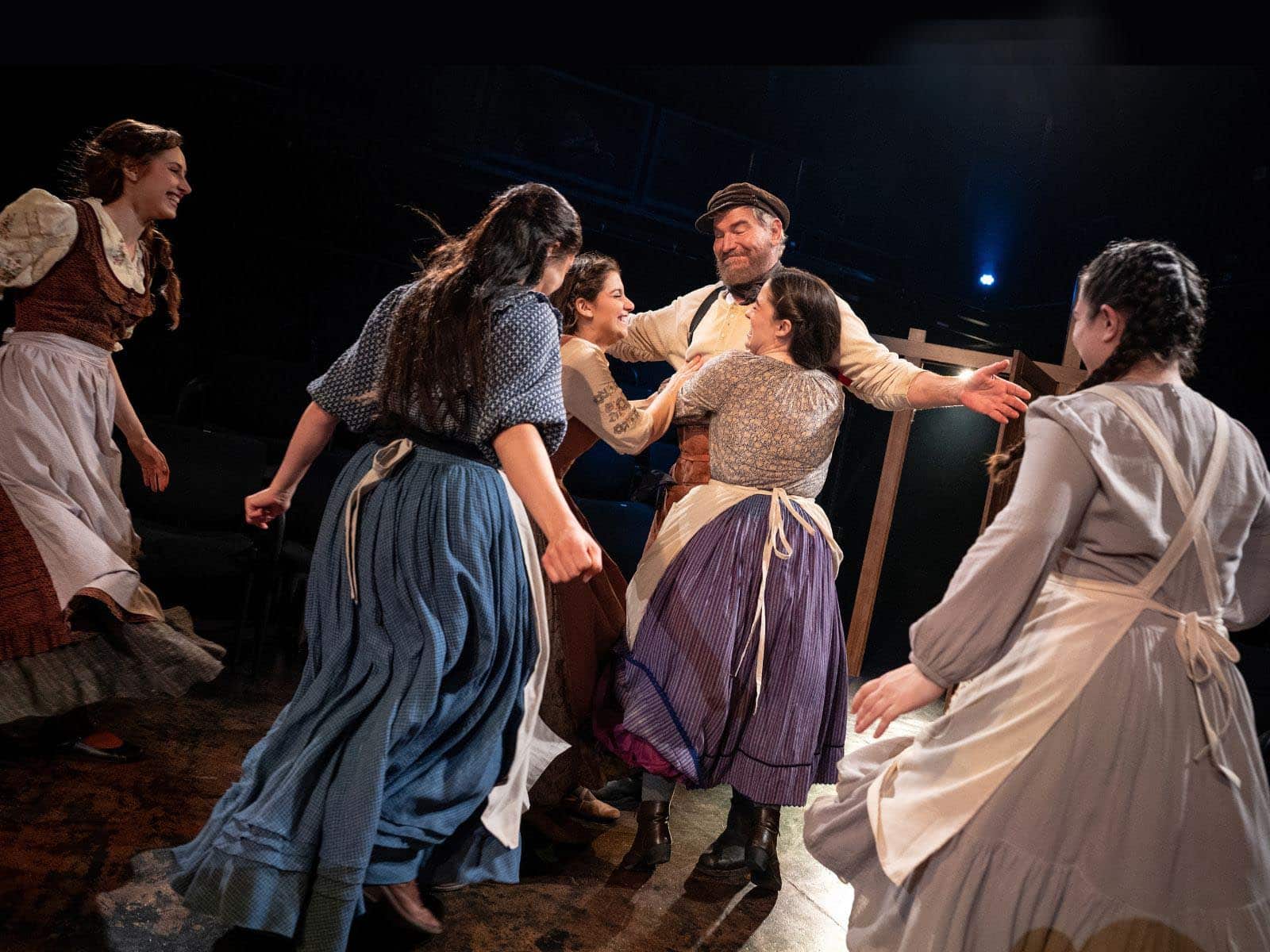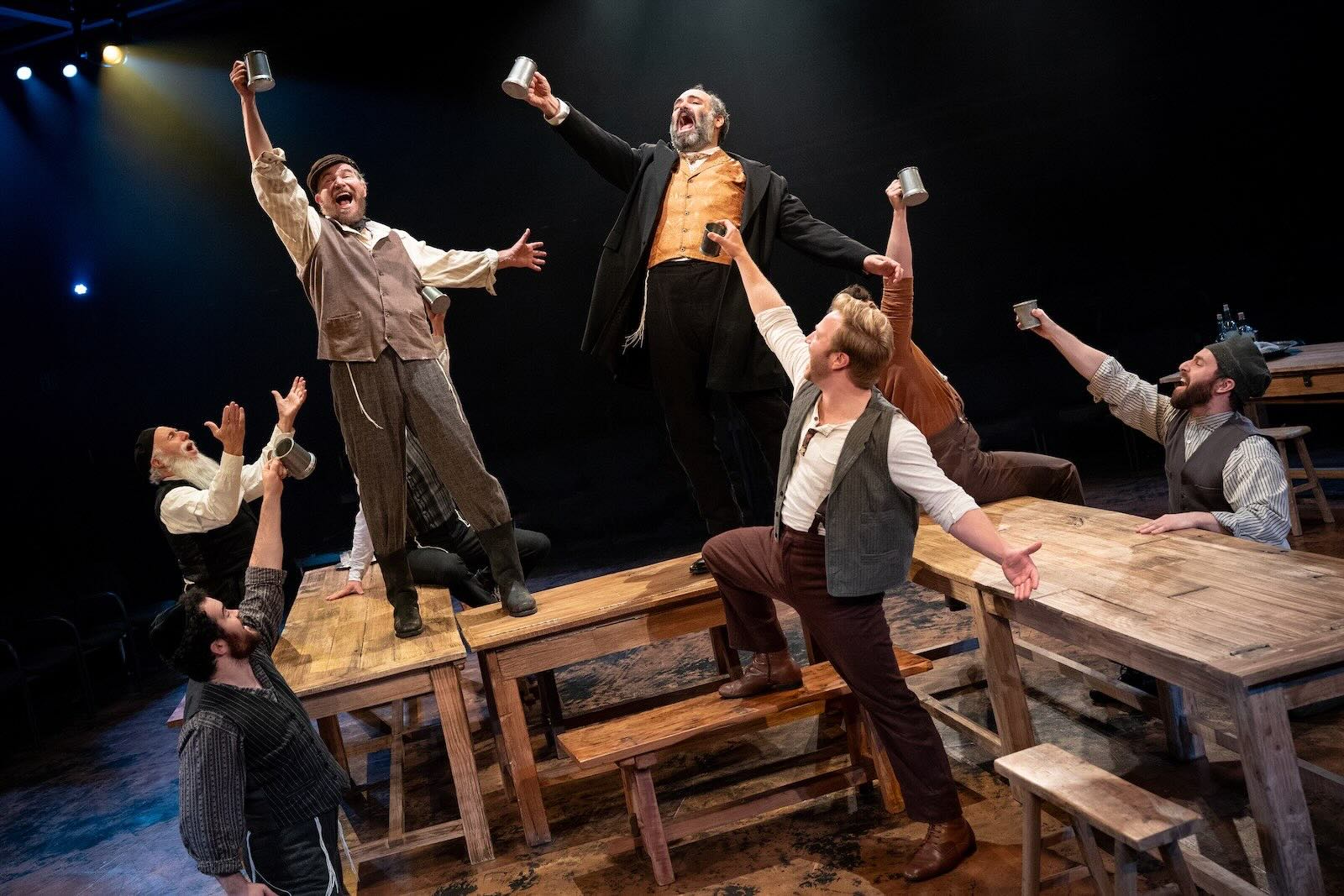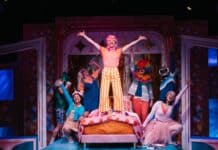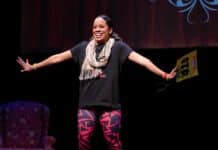Superlatives are often overused. But there are not enough superlatives in the lexicon of praise to describe Signature Theatre’s magnificent production of Fiddler on the Roof. The exquisite musical theater craftmanship of Jerry Bock (music), Sheldon Harnick (lyrics), and Joseph Stein (book) could not be in better hands.
Start with Misha Kachman’s flexible and evocative set. It begins as a large, square table, taking up most of the playing space in the theater’s in-the-round configuration, the solid gathering place for the community and its traditions, around which the cast sings the opening number. As the show goes on, the rectangular pieces that comprise the table are reconfigured for use in various scenes and, one by one, are taken from the stage, until by the time the villagers leave Anatevka for the last time, the stage, save for one broken piece of a table, is bare. The set, as it changes, wordlessly tells Fiddler’s story of change and loss.
One of director Joe Calarco’s loveliest touches — and there are many — comes near the end of the show. The entire cast spreads the large white tablecloth, used to cover the table during the opening “Tradition” scene, over the space where the now-absent table once stood, literally hanging onto the fabric of their community one last time. Then it is ripped away as the villagers prepare to depart into exile. Calarco’s direction is impeccable, down to the last perfectly timed detail.

The center of any Fiddler is, of course, Tevye. Douglas Sills’ physically, vocally, and emotionally powerful portrayal of the character is the best I have ever seen. It is, in fact, the most commanding performance by any lead actor I have seen since Patrick Page’s memorable Lear at the Shakespeare Theatre Company in 2023. Sills drills down to the core of Tevye, in all his strength and vulnerability and love and anger and often rueful humor. His effective singing is always a matter of exploring the character, not merely performing one of Tevye’s familiar numbers.
Golde (Amie Bermowitz), Tevye’s always active and often sharp-tongued wife, is at her best in “Do You Love Me,” the second-act duet in which she and Tevye look at the meaning of their marriage. Tevye is thinking of love in terms of feelings, like those of his daughters for the men in their lives. Golde replies, in effect, that love is action, made up of 25 years of companionship, child-rearing, and running the household. In a nice blocking touch, Tevye and Golde wind up sitting on a bench next to each other, facing opposite directions, as she puts her head on his shoulder on the song’s final notes.
Tevye’s daughters — Tzeitel (Beatrice Owens), Hodel (Lily Burka), and Chava (Rosie Jo Neddy) — sing “Matchmaker, Matchmaker” beautifully. Of the three, Hodel is given the most interesting character material in the script, and Burka makes good use of it. She also gets the heartbreakingly beautiful “Far From the Home I Love” in the second act. In one of the telling details that characterize the production, Burka speaks with emphasis, rather than simply singing, the word “must” as she says to her father, a second time, “I must go.”
Tzeitel’s and Hodel’s beaus, Motel (Jake Loewenthal) and Perchik (Ariel Neydavoud), respectively, each get a euphoric, uptempo love ballad: “Miracle of Miracles” for Motel and “Now I Have Everything” for Perchik. They carry off their numbers with verve. Of the two, Perchik, with his revolutionary enthusiasm, is the more interesting character, with Motel’s initial timidity perhaps being overemphasized. In an often-overlooked smaller role, Alex Stone makes a strong impression as Fyedka, Chava’s Russian (but nonetheless good-guy) love interest.
Calarco has the Russian characters, but not the Jewish characters, speak with accents, a nice way of underlining the distinctions between them. The Russian Constable (Davis Wood) acts as a point of contact between the communities, not altogether unsympathetic to the people of Anatevka, but always willing to follow orders to harm them.
Among the supporting characters, Yente (Susan Rome), the fast-talking, indefatigable matchmaker, is a standout. Rome also plays Grandma Tzeitel in Tevye’s wild and delightfully designed dream sequence, sharing the spotlight with Sarah Corey as Fruma-Sarah. Jeremy Radin shows excellent comic timing as Lazar Wolf, the butcher whose thwarted plans to marry Tzeitel lead to a fracas at her wedding.

The entire ensemble shines in numbers like “Tradition,” “To Life,” “Sunrise, Sunset,” and “Anatevka.” In a show that is as much about community as Fiddler, the superb vocal cohesion and precise movements of the ensemble are critical to the production’s success.
This is a show that moves. Sarah Parker’s choreography is energetic, athletic, and ideally suited to the moment, whether the free-wheeling dancing at the wedding, the surreal dream sequence, or a pair dance for Perchik and Hodel. Parker and Calarco design the movement in the show so that every step, every hand gesture of the musical numbers is tightly coordinated with the music from Jon Kalbfleisch’s excellent 11-piece orchestra, often on a note-specific basis.
Whether in solo or group numbers, this is not a stand-and-sing sort of musical. Presenting the show in the round both necessitates and facilitates the production’s energy and movement, avoiding the static-moment pitfalls that can bedevil many proscenium productions. As needed, given the rapid movement in the blocking and choreography, Tyler Micoleau’s lighting design was always on point with the focus of a scene. Ivania Stack’s costumes were colorful and character-appropriate, and sometimes just plain fun, as in Fruma-Sarah’s frightening black outfit in the dream sequence.
Like any show that deserves to be called a classic, Fiddler has resonance for the times in which it is performed. The show takes place in Ukraine, and the characters lose their homes as a result of Russian oppression. Tevye and some of his family can go to America in 1905 (as did many real-life immigrants, like the young Irving Berlin); in 2025, refugees from other oppressions are not so fortunate. But aside from the marvelous performances and spot-on direction, Fiddler succeeds because it goes to the heart of human relationships in times that, like ours, lack stability and challenge people to live amid sometimes ominous change.
Running Time: Two hours and 55 minutes, including one intermission.
Fiddler on the Roof plays through January 25, 2025, in the Max Theatre at Signature Theatre, 4200 Campbell Avenue, Arlington, VA. Tickets start at $47 and are available by calling the box office at (703) 820-9771, online, or through TodayTix. Information about ticket discounts is available here.
The program for Fiddler on the Roof is online here.
Closed captions are available via the GalaPro app.



